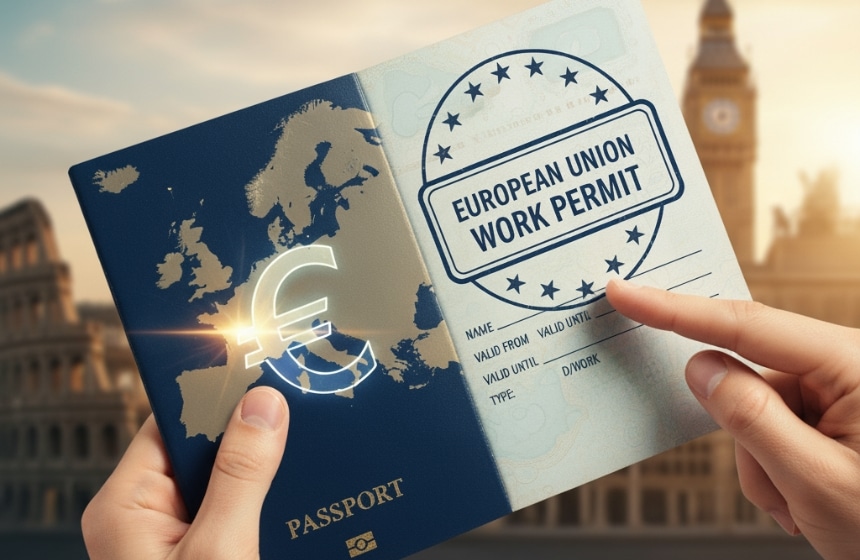There’s no single “Europe work visa.” Europe consists of many countries with individual immigration systems and work visa requirements. Understanding your available work visa options is crucial to building your European career. It’s excellent you’re exploring opportunities in Italy, Spain, France, and Sweden. Visa requirements vary depending on your skills, qualifications, and career goals in each country.
Here are some work visas for European countries that allow Indians to work on the continent.
- Italy Work Visa for Indians
- Spain Work Visa for Indians
- France Work Visa for Indians
- Sweden Work visa for Indians & more
Work Visas for Indians in European Countries
For Indians seeking to work in Europe, the specific visa you need will depend on several factors, including your profession, qualifications, and the country you wish to work in. However, here’s an overview of some standard work visa options for Indians in Europe:
1. EU Blue Card:
This permit applies to 25 EU member states but not Denmark, Ireland, and the UK. It is designed for highly skilled professionals with a recognized university degree and at least 5 years of work experience in their respective fields. The permit streamlines the work permit process, offers priority for family reunification, and facilitates more effortless movement within EU countries.
2. National Work Visas:
Each European Union (EU) member state has its national work visa categories, each with specific requirements and application procedures. Some popular options for Indians include skilled worker visas, intra-company transfer visas, and entrepreneur visas. The requirements to obtain these visas may vary, but they typically involve having a job offer, meeting the minimum salary thresholds, and possessing relevant qualifications.
3. Freelancer/Self-employment Visas:
Some European countries offer visas specifically designed for freelancers and self-employed individuals. Requirements may include demonstrating a viable business plan, having sufficient financial resources, and meeting specific income thresholds.
4. Student Visas with Work Permit Options:
Certain European countries allow international students to work part-time or during holidays while studying. After graduation, some countries offer conversion options to graduate work visas or other employment categories.
Eligibility Requirements for Europe Work Visa
The eligibility requirements for a European work visa vary greatly depending on several factors, including:
- Your nationality: EU citizens generally don’t need work permits in any EU country. Non-EU nationals, however, require specific visas based on their nationality and type of work.
- The country you want to work in: Each European country has its work visa types and processes.
- The type of work you want: Different professions might have dedicated visa tracks or specific requirements.
However, here’s a general overview of some standard eligibility requirements for European work visas for non-EU citizens:
1. Valid Passport
2. Proof of Financial Resources
3. Health Insurance
4. Educational Qualifications
5. Employment Contract or Job Offer
6. Language Proficiency
7. Visa Fees
Additional Requirements:
Depending on the specific visa category and country, you might also need to provide additional documents such as:
- Police clearance certificates
- Proof of accommodation
- Professional licenses or certifications
- Letters of recommendation
How much does it cost to get a European work visa?
Obtaining a work visa for Europe can cost different amounts based on several factors, and there is no one-size-fits-all answer.
1. The country you’re applying to: Each European country sets its visa fees range from around €60 to €200 or even higher. For instance, France charges €99 for a work visa, while Germany has a fee of €75. Spain’s fees, however, depend on the applicant’s nationality, with US citizens paying about $190, Canadians paying $114, and others facing different rates.
2. The type of work visa you’re applying for Different visa categories within the same country might have different fees. For example, a Blue Card visa for highly qualified professionals incurs a higher cost than a regular work permit in Germany.
3. Additional fees: Beyond the standard visa application fee, other potential costs might include:
- Administrative fees: Some countries charge additional fees for processing various documents or biometric data collection.
- Health insurance costs: You’ll likely need health insurance that meets the visa requirements, and premiums can vary.
- Translation fees: If your documents aren’t in the official language of the country you’re applying to, you may need to pay for professional translation services.
- Travel and accommodation costs: You may need to travel or arrange accommodations to attend interviews or submit documents in person.
4. Currency fluctuations: Visa fees are usually denominated in the local currency of the country you’re applying to, so your currency’s final cost can fluctuate based on exchange rates.
Duration of Europe Work Visa?
The duration of a European work visa can vary significantly depending on several factors, including:
1. The country you’re applying to:
- EU Blue Card: Valid for one year in most countries, possibly extending it for up to four years in some countries.
- National Work Visas: These can have variable durations depending on the category and purpose of the visa. Some might be valid for just a few months for specific projects, while others could be granted for one year or even multiple years.
- Freelancer/Self-employment Visas: Initially granted for one year with the possibility of renewal based on successful business performance.
2. The type of work you’re doing:
- Temporary contracts or project-based work might result in a shorter visa duration.
- Permanent positions or established businesses Could lead to a more extended visa validity period.
Who doesn’t need a visa to work in Europe?
While it’s true that citizens of the listed countries (Australia, Canada, Israel, Japan, New Zealand, Switzerland, and the USA) generally don’t need a specific work visa to work in most European countries, it’s not entirely accurate to say they don’t need any formalities or permits to work there.
Here’s a more nuanced explanation:
No specific work visa is needed:
Citizens from certain countries can work legally in most EU and EEA countries without a traditional work visa, thanks to bilateral agreements and free movement principles. However, upon arrival, they must register with the authorities and obtain a residence permit for employment. This process often involves submitting documents such as an employment contract, proof of income and health insurance.
The easiest countries in Europe to get a work visa
Some excellent options for European countries with relatively straightforward work visa processes, each offering unique advantages for aspiring expats. Here’s a breakdown of each country’s visa situation with some visuals to aid your understanding:
Estonia:
This country is famous for its supportive startup ecosystem and e-residency initiative, which makes it appealing for freelancers and remote workers. It also provides a professional visa for highly skilled individuals with recognized degrees and relevant experience. Moreover, the application processing times are relatively fast compared to other European countries.
Norway:
Job opportunities exist in various sectors, including oil and gas, technology, and renewable energy. A skilled worker visa is available for individuals with specific qualifications and job offers. The application process has been simplified with minimal documentation requirements.
Germany:
Europe’s most robust economy, Germany, constantly looks for highly skilled engineering, healthcare, and IT workers. To make it easier for foreign professionals to find jobs in Germany, the “chancenkarte” (opportunity card) allows them to search for employment without a pre-arranged job offer. Various work visa options are available, depending on the applicant’s qualifications and the type of job they seek.
The Netherlands:
Renowned for its multicultural environment, it offers a highly qualified professional visa with fast-track processing for specific jobs. Entrepreneurs enjoy simplified procedures with the “knowledge visa”.
Ireland:
An English-speaking country with a thriving tech industry that offers ample job opportunities for skilled workers. It provides a general work permit for various skill levels and occupations with a streamlined application process, including online options.
The Czech Republic:
A growing economy and affordable living costs attract foreign professionals. Work permits are offered for various occupations based on an employment contract, with relatively low language requirements compared to other European countries.
Please note:
Remember, visa requirements and processes can change frequently, so it’s crucial to consult the latest information from official sources before applying. These are just starting points; further research into specific visa types and eligibility criteria for your chosen country is essential.







